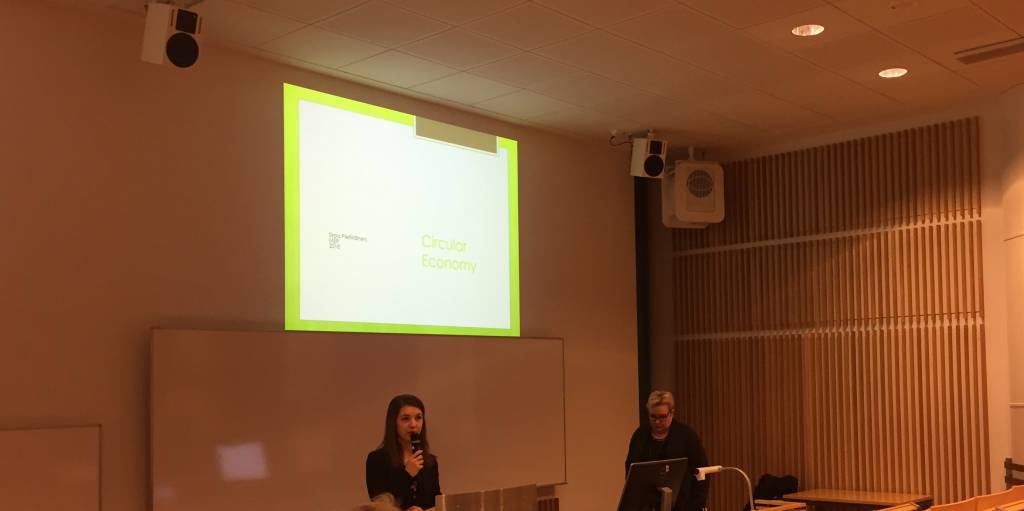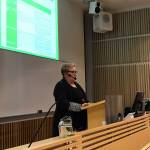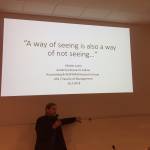People, as well as organizations, are often telling stories of what they do and how good they are at doing it. However, the focus should rather be on doing things so well that stories will be created out of them. At her Leadership for Change Lecture in the Faculty of Management (University of Tampere), Member of the European Parliament Sirpa Pietikäinen (EPP) emphasized the importance of story-doing rather than story-telling in constructing a sustainable society. Doing is the story.

Leaders should understand the bigger picture
Sirpa Pietikäinen called for a more holistic view on sustainability thinking. “You cannot just walk if you want to learn how to run a marathon”, she explained. “You have to think more holistically, taking into consideration running, sleeping, eating, et cetera”. The situation is similar with sustainability: the megatrends of globalization and digitalization can help to reach sustainability, but an understanding which takes into consideration all parts is needed.
Many leaders, however, do not understand the bigger picture. This was one of the key arguments of Pietikäinen. Organizations and actors have to be able to adapt to new situations very quickly. Information reachable quite easily with digital technologies is thus a key to sustainability. For example, information about markets, smart grids and small-scale production may enable greener energy production.
 Understanding knowledge and being able to utilize concepts is as important as economic capital. Pietikäinen argued that the ability to combine digitalization, globalization and sustainability may offer great opportunities for businesses. Businesses can, according to Pietikäinen, help us all: who would like to buy a car, for example, if there are better and more environmental-friendly mobility services available at a better price?
Understanding knowledge and being able to utilize concepts is as important as economic capital. Pietikäinen argued that the ability to combine digitalization, globalization and sustainability may offer great opportunities for businesses. Businesses can, according to Pietikäinen, help us all: who would like to buy a car, for example, if there are better and more environmental-friendly mobility services available at a better price?
In the discussion session after the lecture Pietikäinen mentioned that businesses should not be seen as too benevolent and charitable since their primary objective is after all to make profit. Therefore they should be regulated. On the other hand, she argued, business actors may be more flexible and quicker to react to societal and environmental changes than politicians and administration. Businesses may also be able to develop their activities with longer perspective as they do not need to get quick political victories before next elections.
Even though Pietikäinen seemed to trust more in business actors, one could think that politicians, too, have possibilities to act in favour of environment as many of their voters wish for it, and visionary and long-term thinking can be possible also in politics. Popular politicians can also act as opinion-leaders in environmental questions.
Holistic thinking was one of the key messages of Pietikäinen. It is only by considering sustainability and other problems at the same time that it is possible to solve sustainability challenges. This means not being satisfied with solutions that resolve one question but cause new problems elsewhere. Holistic thinking requires changing our behavior completely, not only taking small and insufficient steps towards sustainability. If we wish to run a marathon, walking more will not help.
However, holistic thinking also has its limits. Small steps can be useful and politically easier to achieve. The idea of a marathon may alienate those interested in going for a walk from sustainability thinking. They may not even start as they find the goal impossible. Therefore, starting with small steps and less ambitious goals could make more people engage in the process. Trying to change everything at once might not always be realistic.
Technological innovations as a solution and a problem
There are two main questions in sustainability, according to Sirpa Pietikäinen: First, goods should remain in use as long as possible. Secondly, materials should be used as effectively as possible. These are also the key elements of circular economy.
Even though technology offers solutions to many contemporary problems, the diversity of goods has increased with technological innovations. If we used to have a TV set and a phone, we nowadays have TV sets, phones, computers and tablets. This is the case even though one device would enable us to watch TV, make calls, browse the internet, and so on. New inventions are not replacing the old ones but are increasing consumption. At the same time, the lifespan of goods has shortened.
However, durable, repairable, reusable and upgradable goods would offer a solution to this. Also, materials should be used in right places. Producers should think if the use of plastic could be avoided, and if it cannot then recycle or upgrade them. Upgrading means that materials can be used in a new product, for example old textiles can be transformed to clothes or linen. Knowledge on how to repair a device should not be a business secret.
It is also important to think about ways of achieving these goals. Should circular economy be promoted by compulsive legislation and political interventions or by self-imposed actions of companies? Interesting perspectives to these questions could also be found in international relations and international organizations, especially as Pietikäinen has a lot of experience from the European Union decision making.
Sirpa Pietikäinen also mentioned that sustainable business management requires regulations but did not specify the relationship between politics and business sector. This left us wondering about the level of regulation suitable and beneficial for both business actors and sustainability goals. Had we had more time, it would have been interesting also to put circular economy into context: how remarkable a role can it have in sustainable development and how is it related to other actions? Therefore it is not easy to really evaluate the significance of this solution to environmental problems.
Measuring can help – or can it?
Associate Professor Matias Laine from the Faculty of Management commented the lecture of Pietikäinen. Laine took up the question of measurability. On the one hand, accounting practices can be a useful tool for making abstract concepts – such as sustainability – measurable, visible and controllable. We usually pay attention to questions that we measure.
 However, Laine also problematized the idea that sustainability accounting and reporting in the corporate sector can enhance the pursuit of sustainability. He questioned the idea of “putting a price tag on everything”. In this context, Laine also presented the McNamara fallacy, which is a warning against blindly trusting in quantitative data and measurement. If we think that concepts and phenomena that are not easy to measure are not important or do not even exist we will be in trouble.
However, Laine also problematized the idea that sustainability accounting and reporting in the corporate sector can enhance the pursuit of sustainability. He questioned the idea of “putting a price tag on everything”. In this context, Laine also presented the McNamara fallacy, which is a warning against blindly trusting in quantitative data and measurement. If we think that concepts and phenomena that are not easy to measure are not important or do not even exist we will be in trouble.
Successful sustainability leaders should thus have many different kinds of measures in use and still be aware that there are unmeasurable concepts essential for reaching a genuinely sustainable way of life.
The blog post was prepared by LFC students Berfin Osso, Tero Penttilä, Karoliina Ruohonen, Noora Suni and Saana Tarhanen.


Comments